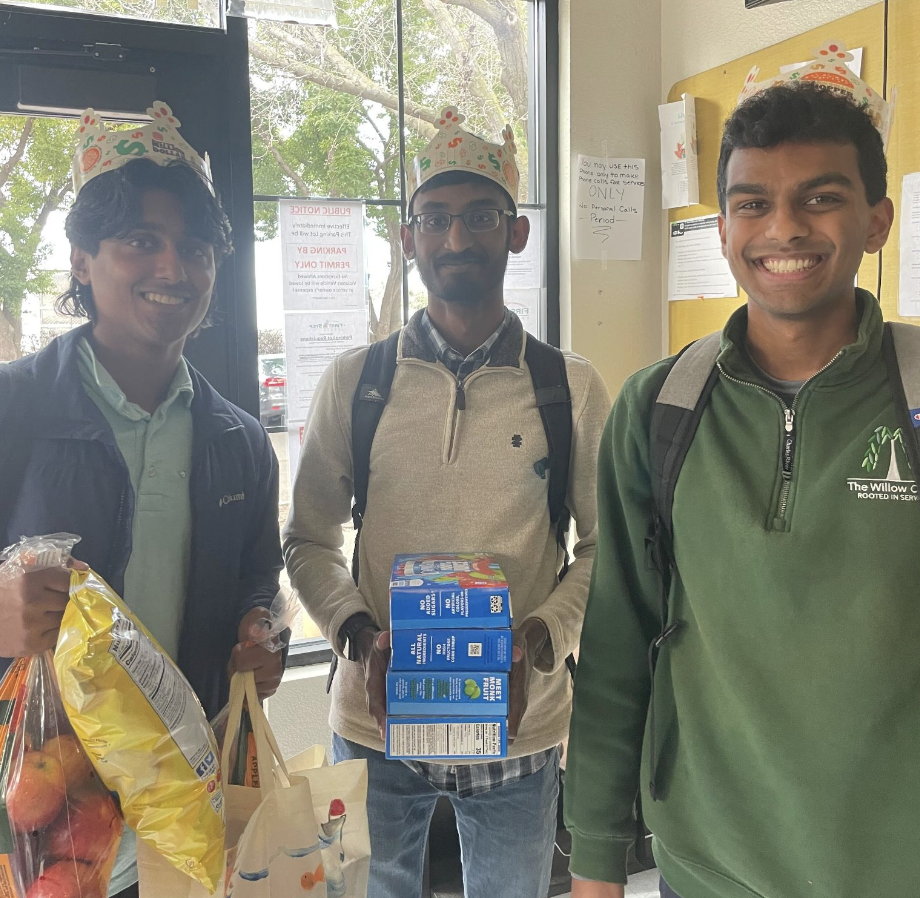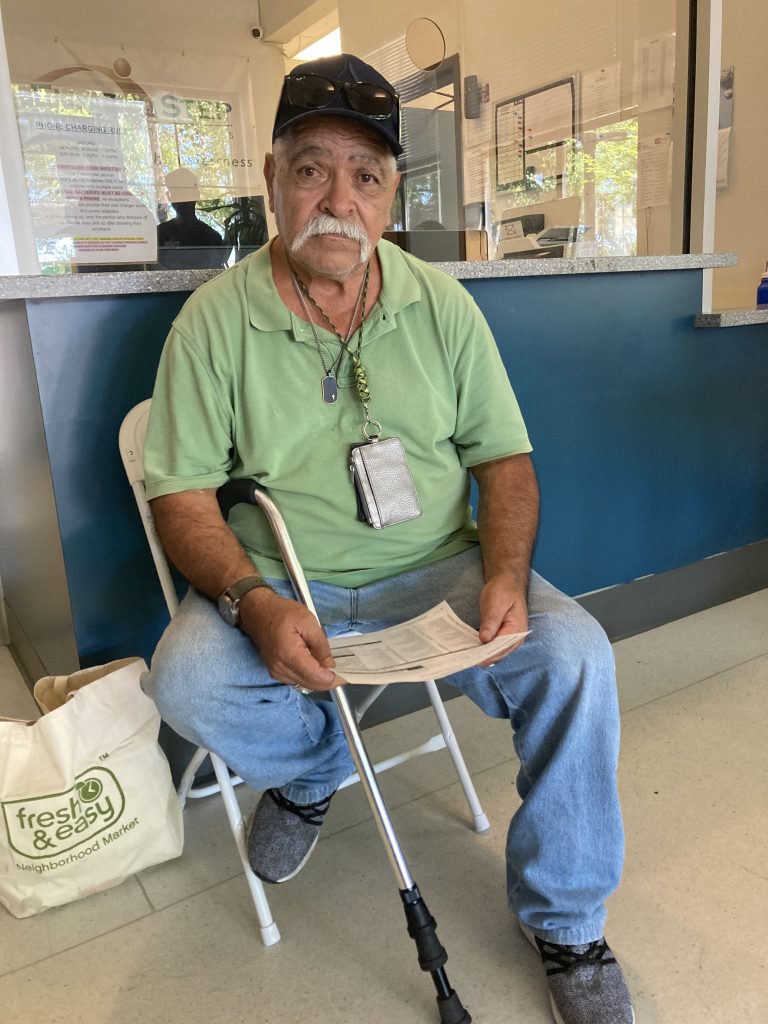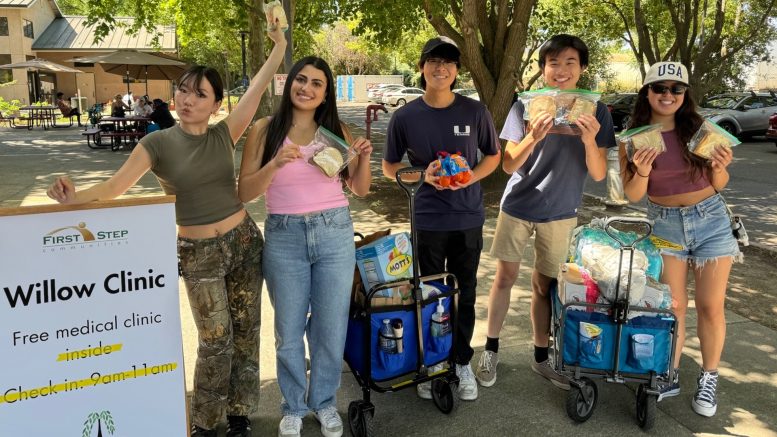By Ken Magri
Once a week, UC Davis students, many of them medical majors, team up with an attending physician to offer free medical services to Sacramento’s homeless community. On Saturday mornings, they create a makeshift facility known as The Willow Clinic at the North A Street Shelter of First Step Communities, a non-profit that works to support Sacramento’s unhoused.
Patients can be seen for primary care, chronic pain and psychiatric concerns “regardless of insurance or documentation status,” according to the clinic’s website. For more serious concerns, a doctor can make referrals to affiliated clinics. Student volunteers also help with medication refills, Medi-Cal paperwork and applications for CalFresh food assistance.
On a hot morning in June, Willow Clinic student volunteers greet patients on a walk-in basis. The atmosphere is friendly and a priority is placed on listening to the patients. To help build trust with patients, undergraduates spend time in the neighborhood before the clinic opens passing out water bottles and explaining the services available to the community. Once open, the students become “advocates” who guide each patient through their visit.
Undergraduate Taylor Schwarz explained that an advocate will walk a patient to the exam room, introduce them to the examining doctor and remain closeby throughout the process. Advocates answer questions about how the clinic operates, translate medical words into simpler terms or run quick errands like picking up prescriptions, if needed.
The medical exam begins with a check of vitals (pulse, temperature and breathing rate) including a blood pressure check and a glucose pinprick test. “That’s just to establish a baseline with the patient,” said undergraduate Pragadeesh Raj. “Many patients have conditions due to diabetes and [high] blood pressure.”
To diagnose mental illnesses like depression, patients are given a PHQ9 screening, a short questionnaire about how they feel. Screenings for anxiety are also available and referrals can be made for follow-up services at First Step Communities’ behavioral help clinic next door. The clinic can also make referrals for medical services like obstetrics and dental care.
“Not only does The Willow Clinic bring healthcare to where our clients are, they also provide pharmacy services to our most vulnerable community,” said Joseph Pacheco, CEO of First Step Communities. “It effectively eliminates many of the barriers to healthcare-services access experienced by our shelter clients.” Pacheco’s data shows that shelter clients seen by a primary healthcare provider, “even if only once, are twice as likely to achieve permanent housing from our shelters.”

Many homeless people distrust the medical system due to previous discrimination. Communication barriers and fear of disclosing drug use can also make homeless patients reluctant to seek help. According to a 2021 study by the National Library of Medicine, homeless patients tend to come in with late-stage illnesses and miss appointments or default on medical services before they are completed.
“I typically don’t go into clinics or anything like that,” said Robyn Hurst, who has been homeless since 2006. Already diagnosed with ringing in her ears, Hurst came in after learning that wax buildup was making her condition worse. “I was told [by a different clinic] that I have buildup and decided to wait for Willow Clinic to do it. They’re going to give me a kit to [remove] it myself.”
Throughout the morning, several homeless people were welcomed into the offices to get water, use the bathroom or relieve stress by getting out of the heat for a while.
Patient Audel Cruiz has visited The Willow Clinic twice in the last year. With foot problems caused by diabetes, Cruiz told the attending physician, Dr. David Betting, that the pain makes it hard to sleep. Betting explained Cruiz’s condition to him, advised him on diet and exercise and prescribed pain medication for the symptoms. Two undergraduates then drove to a nearby pharmacy to pick up the prescription while Cruiz stayed cool inside the clinic’s front office.

Student volunteers earn one unit of university credit for every quarter completed. Not all of them are medical majors, some just want the experience. Nevertheless, it allows them to reflect on a possible future as healthcare professionals while reaching out and supporting the local homeless community.
At the end of the day’s services, Schwarz led a short debriefing for the student volunteers. First-time undergraduates spoke about their experiences and Betting gave details on the treatment he provided to his four patients that morning.
And patients seem to like the clinic. Cruiz said he trusts the doctor’s expertise and was thankful to have his prescription picked up. Hurst also praised the students. “I like that there are young people learning,” she said. “The Willow Clinic has a place that I can just walk to, and trust really isn’t an issue.”
For his part, Pacheco expressed pride in hosting the UC Davis students. “The Willow Clinic provides a critical, life-saving service,” he said.
This story is part of the Solving Sacramento journalism collaborative. Solving Sacramento is supported by funding from the James Irvine Foundation and the James B. McClatchy Foundation. Our partners include California Groundbreakers, Capital Public Radio, Outword, Russian America Media, Sacramento Business Journal, Sacramento News & Review, Sacramento Observer and Univision 19.


Be the first to comment on "The Willow Clinic provides ‘critical, life-saving’ services to Sacramento’s unhoused"